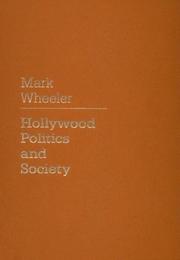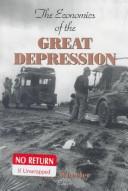| Listing 1 - 4 of 4 |
Sort by
|

ISBN: 1838711406 1838716157 1838716165 9781838716158 9781838716165 9781844571352 Year: 2019 Publisher: London
Abstract | Keywords | Export | Availability | Bookmark
 Loading...
Loading...Choose an application
- Reference Manager
- EndNote
- RefWorks (Direct export to RefWorks)
"At the beginning of the 21st century, the US film industry had overtaken aeronautics and car industries to become one of the highest exporters of American products. Mark Wheeler's important new book provides both a political history of Hollywood and a reflection on the relationship between cinema and politics in America, from 1900 to the present day. Wheeler considers the interplay between the movies studios, state and national government and cultural policy and legislation, with case studies of the censorship that followed in the wake of the Hays Code 1930 and the investigations of the House Committee of Un-American Activities (HUAC) in the 1950s that led to the notorious blacklisting of alleged or known Communist sympathisers. His history of political constituencies within Hollywood ranges from the conservative right to the liberal and the communist left, from trades unionists to movie moguls. The book concludes with a look at the politics of show business, addressing links between Hollywood and political activism, films such as 'The Candidate' and 'Bulworth' that have themselves engaged with the political process, and considering the irony that despite the fact that Hollywood is perceived as a bastion of liberalism the two most famous actors-turned-politicians have been Ronald Reagan and Arnold Schwarzenegger."--Bloomsbury Publishing.
Motion picture industry --- History. --- Political aspects --- Hollywood (Los Angeles, Calif.)
Book
ISBN: 1137410299 1137410302 Year: 2016 Publisher: London : Palgrave Macmillan UK : Imprint: Palgrave Macmillan,
Abstract | Keywords | Export | Availability | Bookmark
 Loading...
Loading...Choose an application
- Reference Manager
- EndNote
- RefWorks (Direct export to RefWorks)
Social media is said to radically change the way in which public communication takes place: information diffuses faster and can reach a large number of people, but what makes the process so novel is that online networks can empower people to compete with traditional broadcasters or public figures. This book critically interrogates the contemporary relevance of social networks as a set of economic, cultural and political enterprises and as a public sphere in which a variety of political and socio-cultural demands can be met. It examines policy, regulatory and socio-cultural issues arising from the transformation of communication to a multi-layered sphere of online and social networks. The central theme of the book is to address the following questions: Are online and social networks an unstoppable democratizing and mobilizing force? Is there a need for policy and intervention to ensure the development of comprehensive and inclusive social networking frameworks? Social media are viewed both as a tool that allows citizens to influence policymaking, and as an object of new policies and regulations, such as data retention, privacy and copyright laws, around which citizens are mobilising. Petros Iosifidis is Professor in Media Policy at City University London. He is author of six books and numerous articles in refereed journals. He is Editor of theInternational Journal of Digital Television and Co-Editor of the Palgrave Global Media Policy and Business Book Series. Mark Wheeler is Professor of Political Communications at London Metropolitan University. He is the author four books including Politics and the Mass Media(Blackwell, 1997), European Television Industries (British FiIm Institute, 2005) (with Petros Iosifidis and Jeanette Steemers), Hollywood: Politics and Society(British Film Institute, 2006) and Celebrity Politics (Polity, 2013). He has contributed to numerous peer reviewed articles to academic journals and has written many chapters in collected editions. .
Culture --- Communication. --- Social media. --- Political communication. --- Public policy. --- Cultural and Media Studies. --- Media and Communication. --- Social Media. --- Regional and Cultural Studies. --- Communication Studies. --- Political Communication. --- Public Policy. --- Study and teaching. --- Social media --- Political aspects. --- User-generated media --- Communication --- User-generated content --- Culture-Study and teaching. --- Political communication --- Political science --- Communication, Primitive --- Mass communication --- Sociology --- Culture—Study and teaching.
Book
ISBN: 1438476868 Year: 2019 Publisher: Albany, New York : SUNY Press,
Abstract | Keywords | Export | Availability | Bookmark
 Loading...
Loading...Choose an application
- Reference Manager
- EndNote
- RefWorks (Direct export to RefWorks)
"On the basis of careful textual exegesis and philosophical analysis, and contrary to the received view, Mark R. Wheeler demonstrates that Aristotle presents and systematically explicates his definition of the essence of the truth in the Metaphysics. Aristotle states the nominal definitions of the terms "truth" and "falsehood" as part of his arguments in defense of the logical axioms. These nominal definitions express conceptions of truth and falsehood his philosophical opponents would have recognized and accepted in the context of dialectical argument. On the basis of these nominal definitions, Aristotle develops his definitions of the essences of truth and falsehood--his "real" definitions of truth and falsehood. Aristotle's methodical exposition of his essential definitions of truth and falsehood in the Metaphysics serves as a well-developed example of how his philosophical inquiry starts with nominal definitions and ends with real definitions. Wheeler also argues for the novel claim that Aristotle defines the most fundamental kind of truth in terms of accurate measurement. Aristotle's metrical conception of truth serves as the theoretical basis for specifying the truth conditions of various assertions, for identifying the sorts of beings implicated in these truth conditions, and for explaining the nature of approximate truth and falsehood. Far from offering us a minimal account of truth, Wheeler shows how Aristotle offers us a sophisticated and metrical theory of truth"--
Truth. --- Aristotle.

ISBN: 058532204X 9780585322049 0880991917 9780880991919 0880991925 9780880991926 Year: 1998 Publisher: Kalamazoo, Mich. W.E. Upjohn Institute for Employment Research
Abstract | Keywords | Export | Availability | Bookmark
 Loading...
Loading...Choose an application
- Reference Manager
- EndNote
- RefWorks (Direct export to RefWorks)
Depressions --- Business & Economics --- Economic History --- United States --- Economic conditions
| Listing 1 - 4 of 4 |
Sort by
|

 Search
Search Feedback
Feedback About UniCat
About UniCat  Help
Help News
News